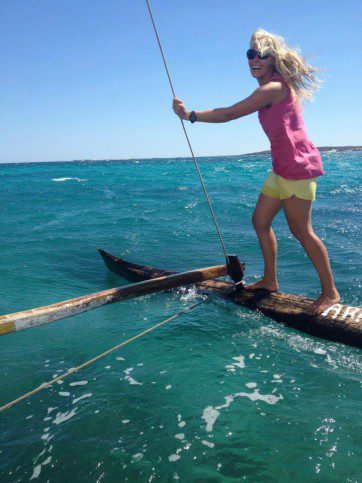In the latest instalment in our series of staff Q&As, we ask Katrina Dewar, Velondriake Project Coordinator, some searching questions about science, conservation and superpowers…
What is your academic/professional background?
I have a BSc in Environmental Science from the University of York, UK, and an MSc in Marine Environmental Protection from Bangor University, UK.
Why do you do what you do?
I have always been interested in development and the environment in general, having had the privilege of growing up in exotic areas such as Madagascar and parts of mainland Africa. Frankly, once I had been on my first dive at the age of about 8, there was no turning back! Being able to breath underwater and witness that incredible world = BEST THING EVER!!
On a more serious note, I do what I do because honestly, the future’s not looking so bright at the moment, and I believe that we really need to work, more than ever, towards creating a more sustainable future for everyone. I think that with a little innovation and drive, globally, we can find solutions to sustainably manage our environments, enabling us to live, prosper and most importantly, leave something behind for posterity. We will likely all be affected by the impacts of climate change, with some of us feeling these impacts more than others, and we need to do what we can now to mitigate and reduce these potential impacts wherever possible.
My desire to work in Madagascar, specifically, is driven by my love of the country and the people. The knowledge that coastal communities in this country are some of the most marginalised communities in the world and some of the most vulnerable to the impacts of climate change makes working here all the more important to me. I was really inspired by the work BV was doing when I came across them during my undergraduate degree, and ever since then, I have wanted to work here. I really believe in taking an integrated approach to conservation, tackling not just the immediate problems apparent on the surface, but identifying and addressing the longer term underlying drivers that are affecting the way and the extent to which we use the environments we depend on.
What is the best/worst thing about your job?
The best thing about this job is that I get to work with the most inspirational team and spend time in the field with communities that we are working with, constantly learning more about both the Malagasy culture and the marine and coastal environment. Essentially I’m doing a job that I have always wanted to do in a place that I love!
The lack of general connection with the outside world can sometimes be frustrating, although it’s also part of the challenge…!

What do you enjoy most about your job?
I think my favourite part of this job is being out in the field, either under water or in villages, working to understand where and how we can best provide technical support to our partner communities, and also finding out whether our programmes so far are actually having the desired impacts both socially and environmentally. These missions are a constant learning curve for me.
What is your favourite species and why?
This is a tricky one – terrestrial – I would say a cheetah because they are just so incredibly fast and graceful. Marine – I think this one has to go the Napoleon Wrasse, purely because they are magnificent creatures, endangered, as so many animals are, by human pressure with their lips alone known to sell on live reef food fish trade markets for an equivalent of US$245 and other meat fetching up to US$130/kg. I personally had a breath-taking close up encounter with two large adults when diving in Velondriake that were the same size as me (and I’m not small), which I will never forget (or stop talking about…).
What would your scientific superpower be?
If I could choose, I would like the ability to regenerate damaged environments.
What is one of the strangest things that has happened to you while working in conservation?
The strangest thing that has happened is that I have developed an interest in sea cucumbers! I never would have imagined myself working on these rather unfortunate looking creatures but they are pretty awesome and can excrete half their guts as a defence mechanism and simply grow more – it’s genius!

